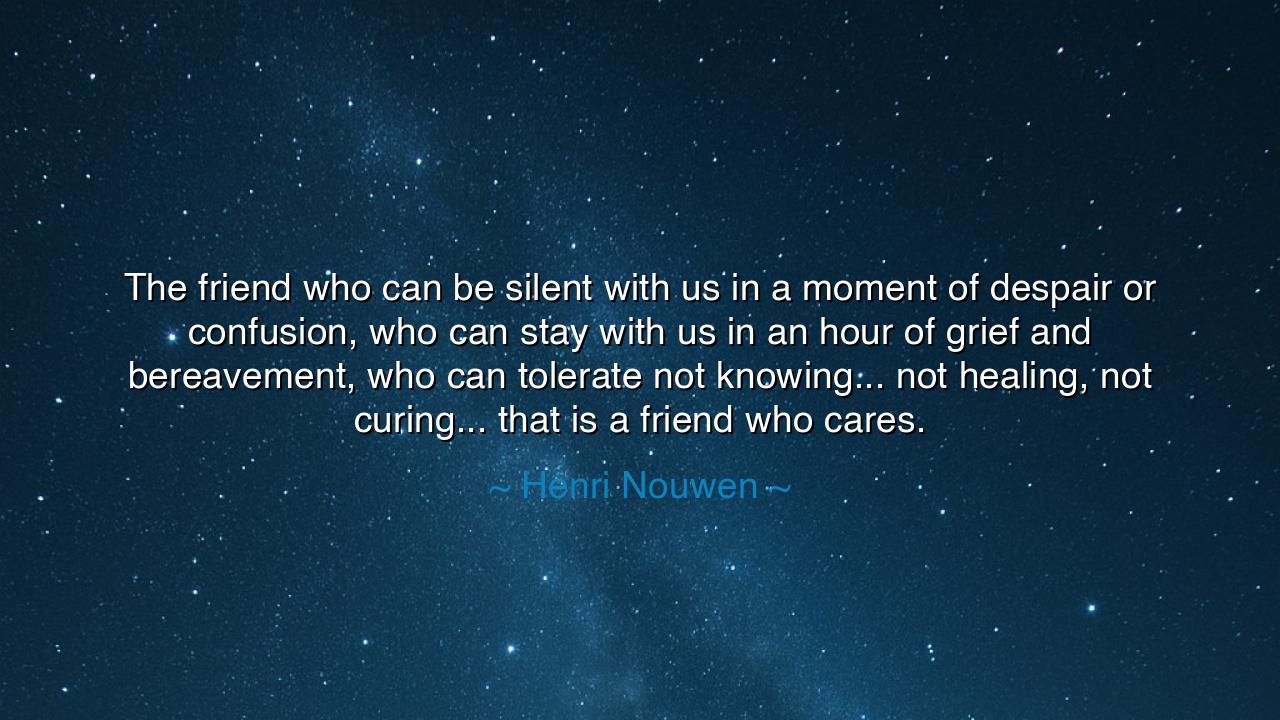
The friend who can be silent with us in a moment of despair or
The friend who can be silent with us in a moment of despair or confusion, who can stay with us in an hour of grief and bereavement, who can tolerate not knowing... not healing, not curing... that is a friend who cares.






Henri Nouwen, the gentle theologian of compassion, once wrote: “The friend who can be silent with us in a moment of despair or confusion, who can stay with us in an hour of grief and bereavement, who can tolerate not knowing… not healing, not curing… that is a friend who cares.” These words rise like a quiet song from the depths of human sorrow. In them, Nouwen reveals the true nature of friendship — that it is not proven in laughter or in triumph, but in silence, presence, and patience. He teaches that the greatest care is not in the fixing of pain, but in the willingness to remain when pain cannot be fixed.
Nouwen spoke from the well of lived experience. A priest, writer, and spiritual teacher, he spent his life studying both the beauty and the brokenness of the human heart. Having known loneliness and inner struggle himself, he came to understand that love does not demand resolution — it demands presence. The origin of this quote flows from his time serving in L’Arche communities, where he lived among people with disabilities and discovered that true friendship needs neither eloquence nor answers. It asks only that one heart stays near another when words fail and life feels unbearable. In this way, he called us back to an ancient truth: that companionship in suffering is a sacred act, a form of love that mirrors the divine.
The friend who can be silent, Nouwen tells us, is rare. For many, silence is frightening; it exposes the vastness of another’s grief, the mystery of pain that cannot be solved. We often rush to speak, to advise, to distract, to mend. But in doing so, we may trample on sacred ground — the wounded space of the soul that does not need words, but understanding. The true friend does not flee from the darkness of another’s heart; he enters it gently, without torch or tool, and sits there, unafraid. His presence becomes the light. Such friendship does not heal by doing — it heals by being.
There is a story told of Job, the righteous man of Scripture, whose life was shattered by unimaginable loss. When his friends first came to him, they saw his sorrow was very great, and they sat beside him for seven days and seven nights, and spoke not a word. In that silence, they honored his grief. But when they began to speak — to explain, to judge, to reason — their friendship faltered. They sought to cure what could not be cured, to make sense of what was meant to be borne. In their words, Job found not comfort, but torment. This tale endures through centuries as a mirror to our own hearts: that often the most loving act is not to fill the air with sound, but to share the silence.
To tolerate not knowing, as Nouwen writes, is itself a mark of spiritual maturity. The world urges certainty and solutions, yet friendship, like faith, thrives in mystery. The one who can sit beside us in the fog — not demanding clarity, not fleeing discomfort — gives us the greatest gift: the assurance that we are not alone. For what the wounded soul fears most is abandonment. The friend who remains through confusion and despair becomes a living reminder of hope — the quiet promise that love endures even in the night.
Such friendship demands humility and courage. It asks that we put aside our pride, our need to be useful, our instinct to fix. It calls us to listen with the heart instead of the mind, to touch with presence rather than words. In moments of grief, the caring friend does not reach for explanations; he reaches for the hand. He does not rush the healing; he waits, faithfully, as a guardian of the wounded spirit. To love this way is to walk the path of the wise — for even the ancient healers knew that time and tenderness are often greater medicine than all the remedies of men.
And so, my children of the human heart, remember Nouwen’s wisdom: to care is to remain. Be the friend who endures the silence. When those you love sink into despair, do not fear their darkness — sit beside them. When they weep, weep with them. When they have no answers, do not give yours. Let your presence speak what words cannot: that love is stronger than sorrow, and that companionship is the bridge across every night.
If you would live by this teaching, then practice this art of holy stillness. Resist the urge to fix; learn instead to accompany. Cultivate patience, gentleness, and the strength to dwell in mystery. For in every soul’s darkest hour, there is one light that never fails — the quiet flame of friendship that cares, not because it cures, but because it refuses to leave. And such friendship, born in silence and tested by sorrow, shall endure like the dawn after a long and sleepless night.






AAdministratorAdministrator
Welcome, honored guests. Please leave a comment, we will respond soon